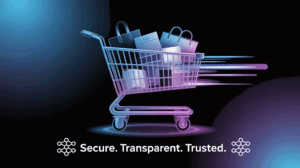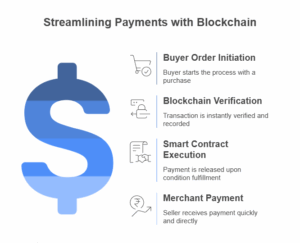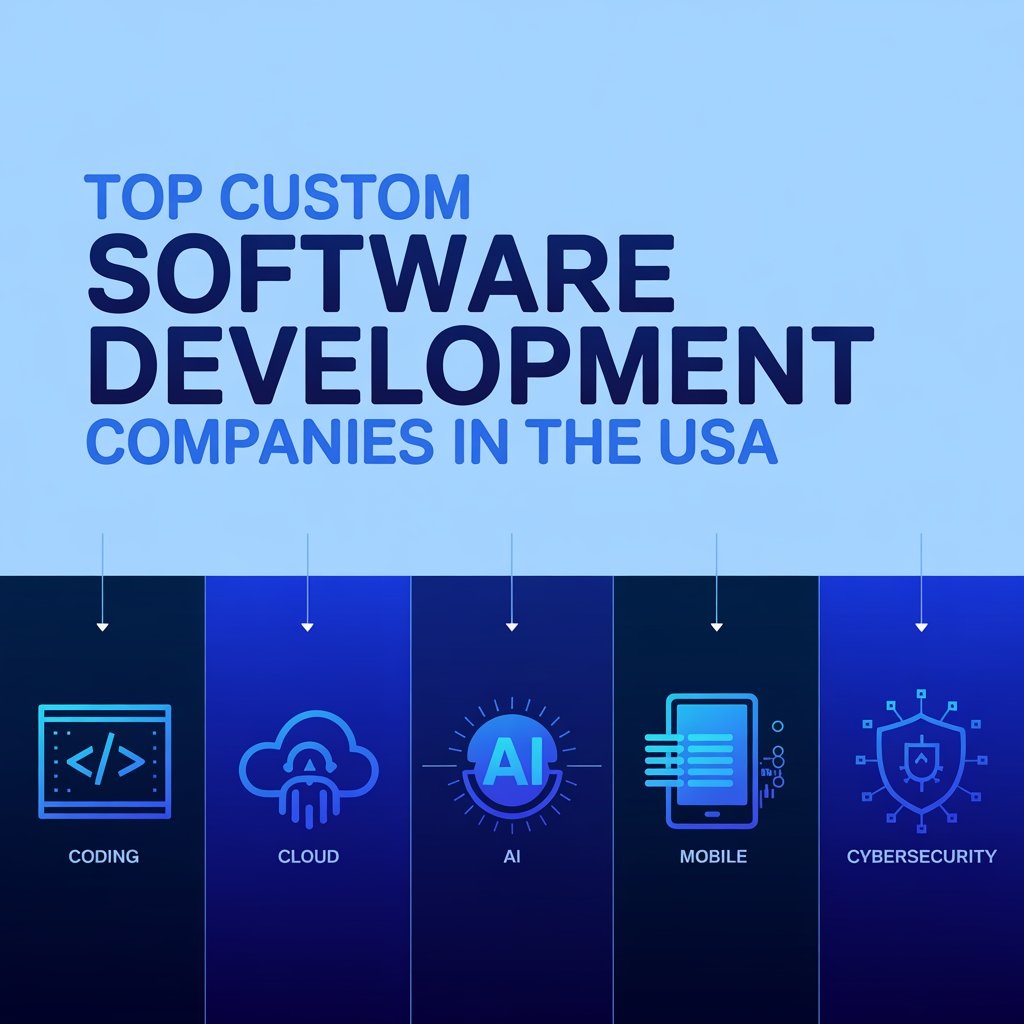The growth of digital commerce has made international trade possible, but it has also presented new difficulties. Delays in payment processing, transaction costs, and an increase in fraud are persistent issues for both consumers and businesses. The disruptive force of blockchain in e-commerce is revolutionising the way online platforms manage payments, verify identities, and maintain transparency.
Decentralised ledger technology is used by a blockchain-based e-commerce platform to eliminate third-party inefficiencies, lower fraud, and expedite payment processes. E-commerce businesses can increase security, speed, and customer trust like never before by utilising blockchain technology to record transactions and authenticate digital identities.
This article explores the ways in which blockchain technology is revolutionising e-commerce, looking at its main advantages, practical uses, and factors to consider before implementing this revolutionary solution.
Why Blockchain in E-commerce is Gaining Traction
The limitations of centralised systems are becoming more apparent as e-commerce expands across borders and industries. Among the issues are fraudulent product listings, payment gateway fees, data breaches, and delays in fund transfers.
Blockchain uses its fundamental advantages to address these problems:
- Decentralization, which eliminates reliance on intermediaries
- Transparency, enabling tamper-proof transaction histories
- Immutability, ensuring data can’t be altered or deleted
- Security, with cryptographic protection across the system
These characteristics make blockchain technology in e-commerce more than just a catchphrase; it’s a useful instrument for enhancing operational trust, lowering the risk of fraud, and streamlining international payments.
Want to know how blockchain benefits supply chains, too? Read: Blockchain in Supply Chain Management
Key Benefits of Blockchain for E-commerce Businesses

The advantages of blockchain technology for e-commerce extend beyond safe transactions. Businesses that use blockchain can revolutionise their payment, inventory, logistics, and customer data management processes.
Here are some major benefits driving adoption:
Faster Payment Processing
Without the need for banks or processors, blockchain allows peer-to-peer payments using cryptocurrencies or stablecoins that can be settled in seconds rather than days. This is particularly helpful for international transactions.
Fraud Reduction
Businesses can verify each transaction and track the origins of products with total transparency thanks to blockchain’s tamper-resistant ledgers. Because every block in the chain is time-stamped and cryptographically linked, it is nearly impossible for anyone to change historical records without the network’s consent. Buyers, sellers, and logistics providers can all rely on the data’s integrity thanks to this degree of immutability.
This significantly lowers the risk of fraudulent product listings, unauthorised payment reversals, and phony orders for e-commerce companies. It becomes simpler to confirm whether a product was shipped as promised, whether a transaction was legal, and even whether an item is authentic or fake. Particularly in industries like luxury retail, electronics, and pharmaceuticals, the ability to track products back to their source also helps fight grey market sales and increases consumer trust.
Cost Savings
Businesses can lower the cost of every transaction by doing away with intermediary fees. Additionally, chargebacks, which cost e-commerce companies billions of dollars every year, are reduced by blockchain platforms.
Better Data Security
Blockchain encrypts user data and distributes it throughout a decentralised network, making it nearly impossible for hackers to change or steal private information. Unauthorised access would be very difficult because, in contrast to centralised systems, any attempt to alter data would necessitate compromising the majority of the network. Blockchain is an effective tool for safeguarding private data in e-commerce because of its inherent security.
Transparent Order Tracking
Smart contracts, which carry out predetermined actions when particular conditions are met, can automate order validation, shipment tracking, and payment releases. For instance, a smart contract can automatically release payment to the seller without human involvement after an order is confirmed and shipped. This lowers the possibility of fraud or human error, in addition to administrative overhead. Customers benefit from increased transparency and peace of mind throughout the purchasing process when real-time order status information, including confirmation, transit updates, and delivery confirmation, is made available. Brand loyalty is strengthened and the overall customer experience is greatly improved by this degree of automation and trust.
How Blockchain Streamlines Payment Processing
Payment settlement is one of the main problems with traditional e-commerce. Due to security checks, delays in foreign exchange, and intermediary verifications, merchants frequently have to wait days for funds to clear. Blockchain’s real-time, direct-to-merchant payments eliminate these obstacles.
Here’s how it works in a blockchain ecommerce app:
- A buyer places an order and initiates payment via cryptocurrency or tokenized digital currency
- The blockchain verifies and records the transaction instantly
- A smart contract releases payment to the seller once predefined conditions are met (e.g., shipment confirmed)
This seamless system gives merchants faster access to cash flow, cuts down on processing times, and does away with third-party fees.

Interested in launching a faster payment system? Explore our Blockchain Development Services
Fighting E-commerce Fraud with Blockchain
One of the main risks to the expansion of e-commerce is still fraud. The financial and reputational harm can be severe, regardless of the cause: identity theft, fraudulent transactions, counterfeit goods, or misuse of chargebacks.
Blockchain technology for e-commerce combats fraud through several mechanisms:
- Immutable ledgers make every transaction traceable and unalterable
- Digital identities stored on the blockchain can verify user authenticity
- Smart contracts enforce fair rules automatically, preventing disputes
- Tokenization ensures payment data isn’t exposed or stored in central databases
Blockchain allows customers to verify the legitimacy of the vendors and the authenticity of the products, while sellers can verify buyers and goods before processing payments.
Examples of Blockchain Applications in E-commerce
Let’s explore how companies are already leveraging blockchain in e-commerce:
Overstock
Overstock, one of the pioneers, has integrated blockchain technology into its financial systems to improve transaction security and transparency, and lets customers pay with Bitcoin.
Shopify + Crypto Payments
Shopify merchants have the option to incorporate cryptocurrency gateways, such as BitPay or Coinbase Commerce, which process orders using blockchain technology instead of banks.
VeChain
Blockchain is used by VeChain to authenticate products and provide transparency in logistics. Assuring consumers of the authenticity of their purchases, it assists luxury brands in tracking valuable goods through the supply chain.
These examples demonstrate how a blockchain-based e-commerce platform can be used to address practical issues in product verification, payments, and logistics. Businesses can speed up transaction times, ensure the authenticity of every product sold, and do away with the need for expensive middlemen by integrating blockchain. Blockchain enables low-cost, almost instantaneous cross-border payments, which is particularly advantageous for international e-commerce companies. It brings end-to-end traceability to logistics, allowing companies to track the flow of goods in real time and minimise losses from fraud or poor management.
Building a Blockchain E-commerce Marketplace: What to Know
Are you considering creating a blockchain ecommerce marketplace? The following are essential elements that you must incorporate:
- Wallet integrations for cryptocurrency payments
- Smart contracts to automate order workflows
- Tokenized assets for product verification or loyalty rewards
- Decentralized identity (DID) for secure user authentication
- Distributed ledgers to store orders and transactions transparently
The long-term benefits in terms of cost effectiveness, security, and user trust are substantial, even though creating such a platform calls for technical know-how and careful planning.
Looking to get started? Hire a blockchain team with real-world e-commerce experience.
Challenges and Considerations
Blockchain has enormous potential for e-commerce, but there are drawbacks as well. Companies must be mindful of implementation issues like:
- Regulatory compliance, especially for cryptocurrency payments
- Integration complexity with legacy systems
- User onboarding, as customers may not be familiar with wallets or tokens
- Scalability, particularly for large e-commerce platforms with high traffic
Nevertheless, companies can overcome these obstacles and create an e-commerce infrastructure that is future-proof with the correct development partner and a phased implementation plan. By beginning with smaller use cases, such as product authentication or blockchain payments, businesses can confidently test, adjust, and scale, reducing risk and optimising long-term impact.
The Future of Blockchain in Online Retail
Blockchain’s use in e-commerce will only grow as it develops. The options are numerous and revolutionary, ranging from tokenised supply chains to decentralised product reviews and loyalty programs.
Full-stack blockchain e-commerce apps that integrate AI for customised shopping, DeFi tools for credit scoring, and NFTs for digital goods—all operating on tamper-proof, trustless infrastructure—may be on the horizon.
Adopting blockchain now gives progressive companies a competitive advantage before it becomes the norm.
Conclusion
By tackling its two main problems—ineffective payment processing and an increase in fraud—blockchain is transforming e-commerce. Blockchain technology for e-commerce provides a solid basis for quicker payments, safer transactions, and more intelligent logistics because of its decentralized, transparent, and secure nature.
Blockchain gives you the tools to increase trust, save money, and confidently operate globally, whether you’re a startup releasing a new blockchain e-commerce app or an enterprise modernising your systems.
Fortunately, LITSLINK has a lot of experience developing custom software. We can also do that for you. Let’s get started—just get in touch with us!





